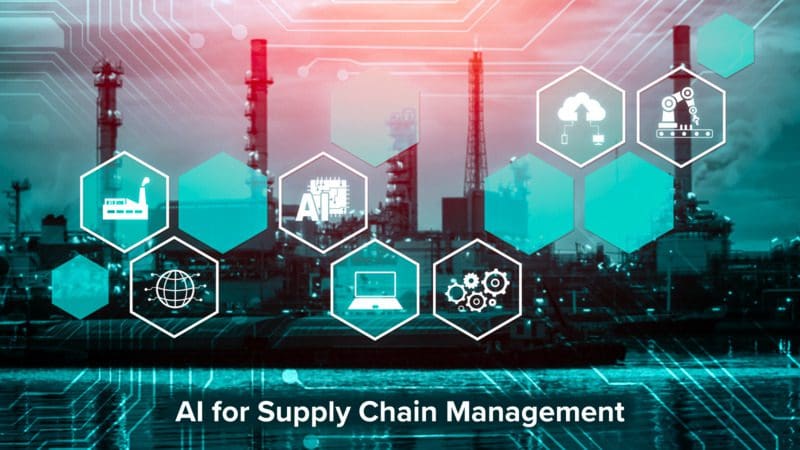5 Ways To Use AI For Supply Chain Management
Using AI to help optimize supply chain management is becoming more prevalent across industries. Early adopters are more resilient and prepared for the inevitable future of artificial intelligence within the supply chain management industry.
Optimizing Our Supply Chain Using Artificial Intelligence
Supply chains have gotten increasingly more complicated to manage in recent years. Physical flows are becoming more interconnected and market volatility has increased the requirement for agility and adaptability.
This has only been exacerbated by the COVID-19 pandemic which has seen an increased global demand for resources while juggling a variety of changing pandemic precautions. This is why using AI to help optimize supply chain management is becoming more prevalent across industries. Early adopters are more resilient and prepared for the inevitable future of artificial intelligence within the supply chain management industry.
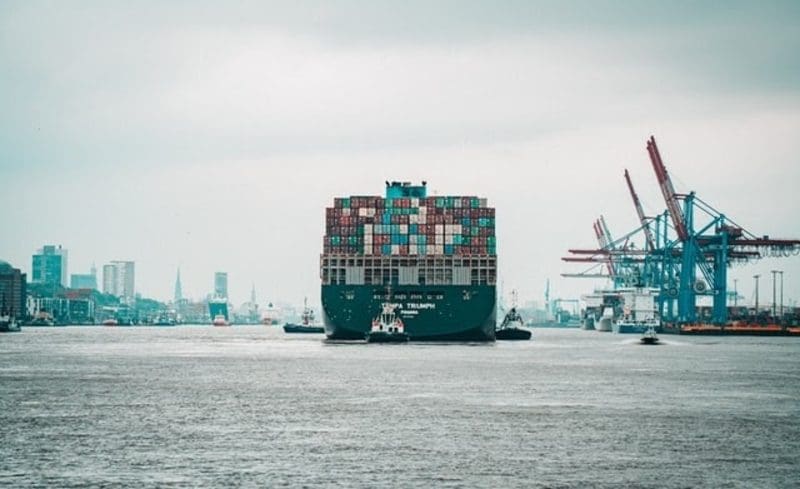
Using AI to manage shipping, Image Source
Supply chain management is a web connecting transportation, production, acquisition, marketing, sales, and more. Companies can use supply chain management to create integrated plans to balance trade-offs across activities, thereby optimizing earnings. Managing these supply chains can become a gargantuan task without help.
Using AI for supply chain management is one way many companies are beginning to pivot to handle the increasing difficulty of supply chains globally and locally. In this blog post we look at how AI can be used, which companies are using it best, and also identify 5 ways people are currently using artificial intelligence to get a better grasp on managing the supply chain.
How Can AI Be Used In The Supply Chain Process?
Using the massive amount of data generated by company operations, an organization is able to use AI-enabled solutions and teams of data scientists to transform supply chain operations: implementing factory automation; improving quality control, forecasting demand; predictive maintenance; and so much more!
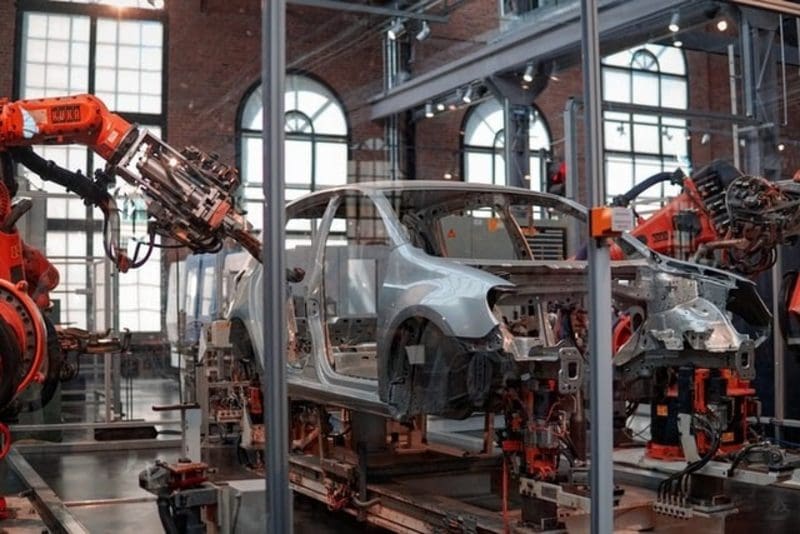
Automobile assembly line, Image Source
Supply chain departments are working as part of the brains of the operations they are attached to. The role of supply chain management has become so central to organizations as they get bigger that they are now becoming a major independent industry of their own.
Supply chain issues are not a result of a lack of trying, instead they are usually the result of the entire industrial complex being overwhelmed by demand during the pandemic. Rather than focusing on supplying needs across departments of an organization, supply chains have more recently become associated with maximizing a company’s value and performance.
The industry has moved from focusing on the logistics of moving product to customers to focusing on growing supply in certain industries being hit by abnormal demand. And companies are leaning more on AI solutions to make this happen in order to thrive in these crazy times.
AI-based solutions are more readily available and accessible to assist businesses in achieving next-level supply-chain management performance.
Those successfully using AI-enabled supply chain management have been able to reduce logistics costs by 15%, inventory by 35%, and service levels by 65% when compared to competitors who are not adapting to and using artificial intelligence for supply chain management.
Which Companies Use AI In Supply Chain Management?
AI is quickly gaining popularity in the supply chain and logistics industry. It is becoming increasingly apparent to supply chain and logistics industry leaders that AI is more than capable of handling the complexity involved in running both local and global logistics networks.
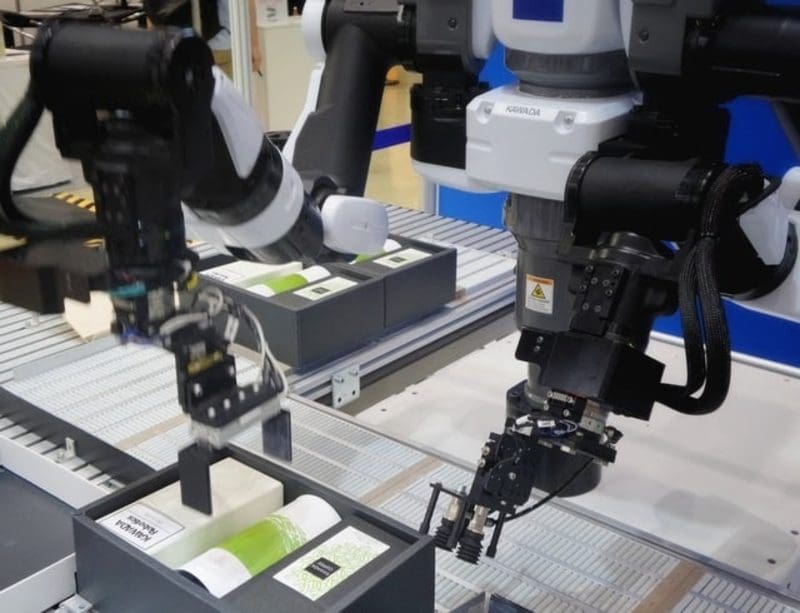
AI on the assembly line, Image Source
Artificial intelligence is transforming the industry by more efficiently tracking operations, improving supply chain management and productivity, supplementing business plans, and even interacting with online customers.
It is only natural that major companies like IBM and Google are taking full advantage of AI for supply chain management, but companies not typically known for using advanced artificial intelligence programs are starting to pay attention, too.
Oracle, for example, is utilizing artificial intelligence to create databases that are self-updating and self-managing that their clients can use and take advantage of. Coupa is another company using AI for supply chain improvement and management. Coupa has created an entire business structure around helping businesses manage their own supply chains with the help of AI and other deep learning programs.
The logistics industry, from how truck drivers are organized to how products are ordered and scheduled, has almost completely adopted AI at various stages of their supply chain. With each new success, more businesses are jumping on board to optimize their business models with the adoption of AI in the supply chain process.
5 Ways Artificial Intelligence Is Used In Supply Chain Management
Using AI to organize truck deliveries, Image Source
According to several studies, artificial intelligence can provide supply chain and logistics operations unparalleled value, as has been mentioned above. Companies across the world are beginning to favor AI for supply chain improvement and management.
Whether they are looking at using AI to cut costs by eliminating operation redundancies and risk, mitigating unnecessary risk, improving supply chain forecasts, delivering products faster and more efficiently, or revitalizing their customer service strategies, AI is becoming critical to supply chain management.
Specifically, AI is making huge waves in being able to create demand forecasting models, increasing end-to-end transparency, integrating business plans, generating dynamic business optimization models, and, of course, vastly improving physical flow automation.
1. Demand Forecasting Models
One of the primary purposes of our supply chain is to maintain optimal stock levels to avoid out-of-stock catastrophes or having stock overflow. Balancing inventory and warehouse management is key to achieving the optimal supply chain.
When AI is used to create models for demand forecasting, they can produce fairly accurate estimates of future demand against current stock.

Demand forecasting models, Image Source
For example, an AI program can be used to anticipate a product's decline and end-of-life (EOL) cycle on a sales channel. The program can then create models for new products expected to make breakthroughs into the market, replacing any product reaching EOL.
Using AI for demand forecasting is helping many companies maximize a product's lifecycle in the market.
2. End-to-End Transparency
The current forecast for supply chains globally is complicated, at best. It is more vital than ever for manufacturers to have total visibility of their entire supply chain.
Manufacturers need to see at a glance how their products are coming together, how much is being produced, and how much is being shipped out.
Cognitive AI-driven automated programs are being used to provide data visualizations that can be used to reveal supply chain issues causes and effects, reduce or eliminate bottleneck complications, and identify opportunities to improve and advance the supply chain.

Data visualized on a map, Image Source
Artificial intelligence for supply chain management can do all of this, not only by using historical data, but also by taking in and comprehending real-time data across multiple layers of the supply chain.
3. Integrated Business Planning
Supply chain managers struggle to fully optimize a supply chain because they are unable to see in real-time, detect variances in expanded product portfolios, comprehend shifts in consumer demand trends, or stay up-to-date on unexpected events like factory shutdowns and transportation issues.
These are all complex processes that, typically, go through multiple layers of communication before reaching supply chain managers.
However, AI solutions can integrate with many of these systems and allow for business plans to be integrated across multiple companies and stages of production.
When these business plans and supply chains are in sync, then each supply chain manager is able to have a better grasp on their product distribution.
4. Dynamic Planning Optimization
Just as AI is able to integrate business plans across multiple companies, AI programs are also being used to generate cognitive predictions and recommendations to further improve and optimize the supply chain planning process.
This can save a company a ton of time in planning it out through complicated manual business models, and reduce mistakes during this process.

Image Source
AI-integrated supply chain software magnifies crucial factors in the supply chain to further optimize the process from conception to delivered products. This improves the performance of the supply chain by assisting manufacturers in determining the potential consequences of various scenarios in terms of time, cost, and revenue.
5. Physical Flow Automation
In supply chain forecasting and the optimization of the planning stage, artificial intelligence can ensure material bills and purchase order data are structured and filed correctly, creating more accurate predictions in real-time.
This allows for data-driven field operators to maintain optimal levels based on current, and predicted, consumer demand. The ability to recognize and manage these optimal levels is made possible by AI integrations in the supply chain.
There are artificial intelligence programs created to monitor and modify supply chain processes with the help of computer vision using physical sensors. This keeps an accurate and updated spreadsheet of supplies on hand in real-time.
Taking it one step further, though, some AI can go so far as to automatically perceive a need in the supply chain and order appropriately to maintain optimal levels, without the need for field operators or supply chain managers to do physical inventory counts on their own before doing so. For example, monitoring product on store shelves and cross referencing the remaining product inventory and current demand for the product, in order to actively reorder stock if demand is high and inventory is almost out.
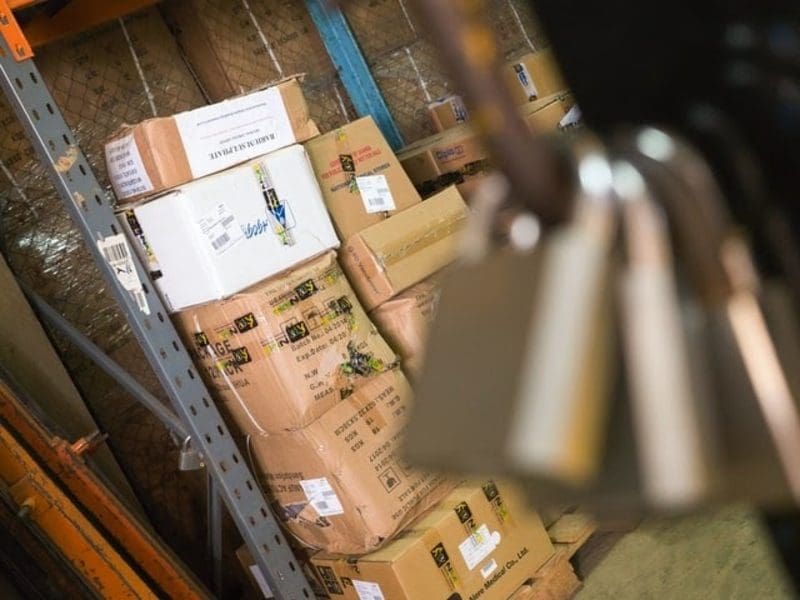
Image Source
All of this data and overall operational structure of an organization are invaluable in managing the supply chain as businesses try more to automate physical materials and product flow.
Looking For More Information On AI or Supply Chain Management?
Using artificial intelligence to better manage our supply chain is already in practice in today's world, and is rapidly becoming standard across every industry. As it becomes ubiquitous, countries may move to a global standardization of supply chain practices in order to streamline the process for a smoother movement of resources and products across borders.
Kevin Vu manages Exxact Corp blog and works with many of its talented authors who write about different aspects of Deep Learning.

